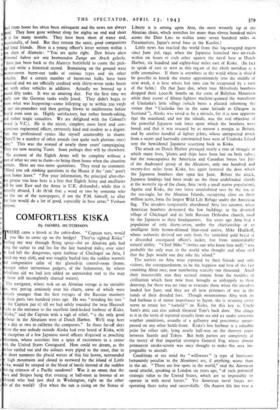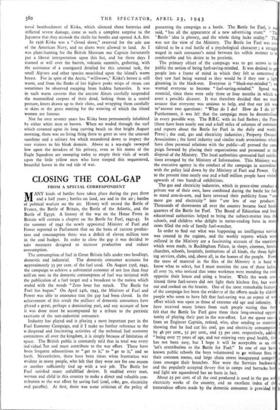COMFORTLESS KISKA
By ISOBEL HUTCHISON HERE came a knock at the cabin-door. "Captain says, would you like to come up on the bridge? They've sighted Kiska." attling my way through flying spray—for an Aleutian gale had ung the cutter to and fro for the last hundred miles, ever since e had left the dangerous, open harbour of Chichagof on Attu, I und my way aloft, and was roughly hurled into the sudden warmth id comparative calm of the glassed-in control-room (home, mongst other mysterious gadgets, of the fathorneter, by whose elodious aid we had just added an unrecorded reef to the map these still incompletely charted waters).
The navigator, whose task on an Aleutian voyage is no enviable ne, was poring anxiously over his charts, some of which were carcely younger than the first voyages of the Russian mariners these parts two hundred years ago. He was " minding his toes" is the Captain put it) till we had safely rounded the twin Haycock cks at the entrance to the excellent land-locked harbour of Kiska. Kiska,"'said the Captain with a sigh of relief, " is the only good arbour in the Aleutians west of Dutch Harbor. We'll stop here r a day or two to calibrate the compasses." In those far-off days efore the war nobody outside Alaska had ever heard of Kiska, with to exception of a few Japanese naval officers disguised as poaching shermen, whose activities lent a spice of excitement to a cruise ith the United States Coastguard. How could we dream, as the chor rattled out and the colours were piped to the mast, that in e short summers the placid waters of this fair haven, surrounded y high motuitains and closed to eastward• by the island of Little iska, would be steeped in the blood of battle instead of the sudden timing crimson of a Pacific sundown? Was it an omen that the tars and Stripes hung that evening at half-mast in honour of art 4miral who had just died in Washington, right on the other de of the world? (For when the sun is rising on the Statue of
Liberty it is setting upon Attu, the most westerly tip ot the Aleutian chain, which stretches for more than eleven hundred miles across the Date Line to within some seven hundred miles ot Paramushiro, Japan's naval base in the Kuriles.)
Little news has reached the world from this fog-wrapped region since June 3rd, top, when the Japanese launched two air-raids within six hours of each other against the naval base at Dutch Harbor, six hundred and eighty-four miles east of Kiska. (In fact to speak of east or west in this region of the 18oth meridian is a trifle anomalous. If there is anywhere in the world where it shou:d be possible to knock the enemy approximately into the middle of next week, it is here where lost time can be recaptured by a turn of the helm.) On that June day, when four Mitsubishi bombers dropped their z,000-lb. bombs on the roots of Ballyhoo Mountain while their escort of fifteen fighters machine-gunned the waterfront of Unalaska's little village (which bears a placard informing the visitor that " Unalaska lies in the same latitude as Glasgow in Scotland "), Alaska was saved as by a miracle, for it is now apparent that the mainland, and not the islands, was the real objective of the powerful Japanese task force upon which the bombers were based, and that it was rescued by as narrow a margin as Britain, and by another handful of fighter pilots, whose unexpected attack from a secret and hurriedly constructed base west of Unalaska Island sent the bewildered Japanese scurrying back to Kiska.
The attack on Dutch Harbor presaged nearly a year of struggle in which many lives, 'planes and ships have been lost on both sides ; but the reoccupation by American and Canadian forces last July of the Andreanof group of the Aleutians, only one hundred and twenty-five miles from Kiska, has again fastened the door which the Japanese bombers shot open last June. Before the attack, Japanese landings had been made on the three undefended islands at the westerly tip of the chain, Attu (with a small native population), Agattu and Kiska, the two latter uninhabited save by the fox or the sea-eagle, for the Aleutian Islands, occupying close on three million acres, form the largest Wild Life Refuge under the American flag. The invaders temporarily abandoned Attu last autumn, when American bombers destroyed the few buildings in the deserted village of Chichagof and its little Russian Orthodox church, used by the Japanese as their headquarters. Six years ago Attu had 3 population of only thirty-seven, under the chieftainship of an intelligent little brown-skinned blue-eyed native, Mike Hodikoff, whose authority derived not only from the tarnished gold braid of a discarded coastguard officer's jacket, but from unmistakable natural ability. "Chief Mike " (writes one who knew him well) " was probably the only man in the world who thought and often said that the Japs would one day take his island."
The natives on Attu were reported by their friends and only visitors, the coastguardsmen, to be the happiest and best of the fast vanishing Aleut race, now numbering scarcely one thousand. Amid their inaccessible seas they seemed remote from the troubles of civilisation which have now been brought so unhappily to their doorstep, for there was no time to evacuate them when the invaders landed last June, and they are all now prisoners of war in the hands of their dreaded foes. Though mountainous Attu with its bad harbour is of minor importance to Japan, she is straining every nerve to retain her " toehold " on Kiska, for this key. to Uncle • Sam's attic can also unlock General Tojo's back door. Shc clings to it in the teeth of repeated assaults from sea and air under atrocious weather conditions, assaults of a gallantry and persistence unsur- passed on any other battle-front. Kiska's fine harbour is a valuable prize for either side, lying nearly half-way on the shortest route between Seattle and Tokyo. But both parties are completely at the mercy of that impartial strategist General Fog, whose almost permanent smoke-screen was once thought to make this area im- pregnable to aircraft.
Conditions at sea amid the " williwaws " (a type of hurricane fortunately peculiar to the Aleutians) are, if anything, worse than in the air. "There are few spots in the world," said the American naval attache, speaking in London six years ago, "of such potential strategic value to the United States, which are so impossible to operate in with naval forces." Yet American naval forces arc operating there today and successfully. On August 8th last year a naval bombardment of Kiska, which silenced shore batteries and inflicted severe damage, came as such a complete surprise to the Japanese that they mistook the shells for bombs and opened A.A. fire.
In 1936 Kiska was a " closed shore," reserved for the sole use of the American Navy, and no aliens were allowed to land. As I was plant-hunting for the British Museum our Captain fortunately put a liberal interpretation upon this fiat, and for three days I roamed at will over the barren, volcanic summits, gathering, with the assistance of a coastguard detailed for this unusual task, the small Alpines and other species nourished upon the island's warm breast. For in spite of the Arctic " williwaws," Kiska's breast is still warm, and from the flanks of her highest peaks wisps of steam can sometimes be observed escaping from hidden fumaroles. It was in such warm caverns that the ancient Aleuts carefully suspended the mummified corpses of their dead, lashing them in a seated posture, knees drawn up to their chins, and wrapping them carefully in skins or the grass matting for the weaving of which the island women are famous.
Not for over seventy years has Kiska been permanently inhabited by either white men or brown. When we waded through the surf which creamed upon its long curving beach on that bright August morning, there was no living thing there to greet us save the unusual sunshine and a solitary fox which meandered down to inspect the rare visitors to his bleak domain. Above us a sea-eagle swooped low upon the invaders of his privacy, even as his mates of the Eagle Squadron are swooping today to empty their vials of wrath upon the little yellow men who have steeped this sequestered, beautiful haven in the red tide of war.



























 Previous page
Previous page